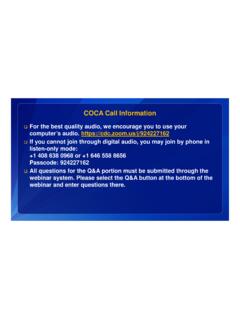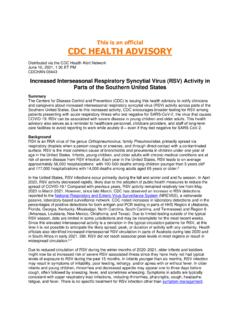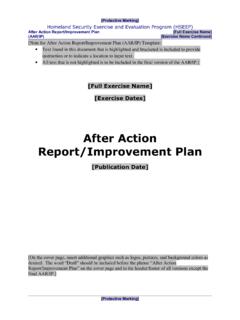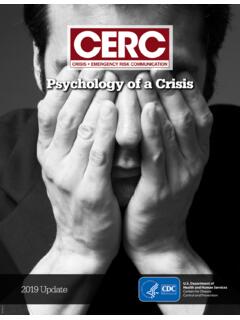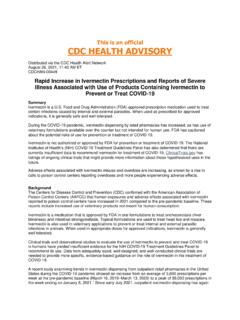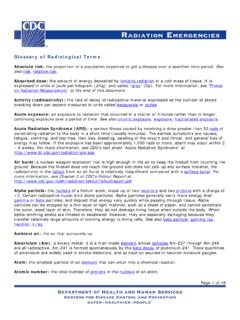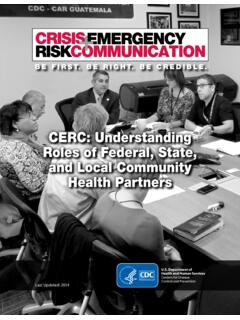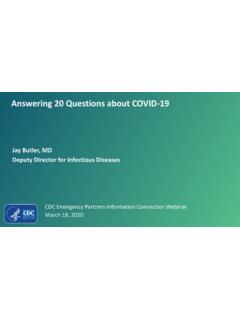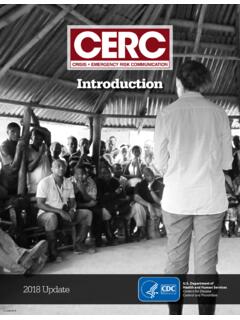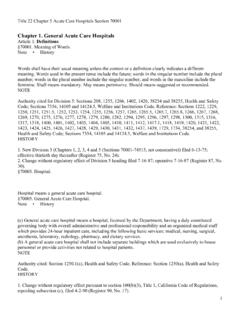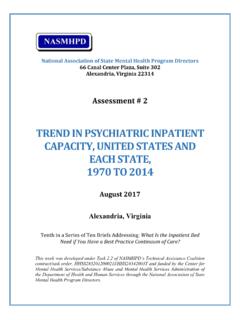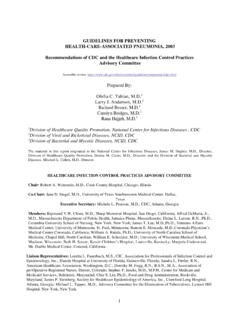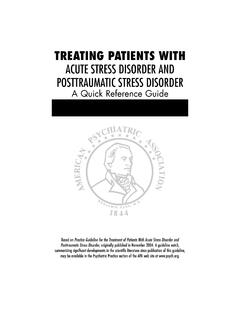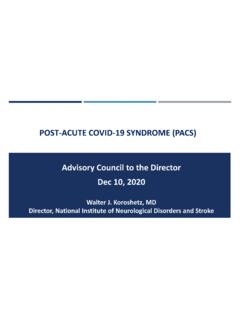Transcription of Evaluating and Caring for Patients with Post-COVID Conditions
1 Centers for Disease Control and PreventionCenter for Preparedness and ResponseEvaluating and Caring for Patients with Post-COVID Conditions Clinician Outreach and Communication Activity (COCA) WebinarThursday, June 17, 2021 Free Continuing Education Free continuing education is offered for this webinar. Instructions on how to earn continuing education will be provided at the end of the call. Continuing Education Disclaimer In compliance with continuing education requirements, CDC, our planners, our presenters, and their spouses/partners wish to disclose they have no financial interests or other relationships with the manufacturers of commercial products, suppliers of commercial services, or commercial supporters with the exception of Dr.
2 Michael Saag who would like to disclose that he is the principal investigator on two studies with Gilead and ViiV, and Dr. Alex Vosooneywho would like to disclose that she owns 10 shares of stock in 3M. Planners have reviewed content to ensure there is no bias. The presentation will not include any discussion of the unlabeled use of a product or a product under investigational use. CDC did not accept commercial support for this continuing education the conclusion of today s session, the participant will be able to accomplish the following Describe the symptoms and Conditions associated with Post-COVID Conditions .
3 Determine which clinical assessments and tests are needed for a patient, while reducing burden from excessive testing and medical encounters. Describe the medical home approach and how it can be used to optimize patient Ask a Question Using the Zoom Webinar System Click on the Q&A button Type your question in the Q&A box Submit your question If you are a patient, please refer your question to your healthcare provider. If you are a member of the media, please direct your questions to CDC Media Relations at 404-639-3286 or email s Presenters Jennifer R.
4 Chevinsky, MD, MPHE pidemic Intelligence Service OfficerPost-COVID-19 Conditions UnitCOVID-19 ResponseCenters for Disease Control and Prevention Alex Vosooney, MD [No Slides]Chair, Subcommittee on Clinical Recommendations and PoliciesAmerican Academy of Family Physicians Michael Saag, MD[No Slides]Professor of MedicineDirector, UAB Center for AIDS ResearchUniversity of Alabama and Caring for Patients with Post-COVID ConditionsJennifer Chevinsky, MD, MPHJune 17, 2021 Clinician Outreach and Communication Activity COCA Call8 Interim Guidance for Healthcare ProfessionalsInterim guidance was informed by individual expert opinion, large medical organizations, and patient groups.
5 Background General considerations Suggested workup Management Clinical and public health recommendations Future directionsBackground10 Post-COVID Conditions is an umbrella term Post-COVID Conditions is an umbrella term for the wide range of physical and mental health consequences experienced by some Patients that are present four or more weeks after SARS-CoV-2 infection, including by Patients who had initial mild or asymptomatic acute Conditions are heterogenous Several patterns have been identified Persistent symptoms New-onset late sequelae Evolution of symptoms/ Conditions Attributable to different underlying pathophysiologic processes Presentation could be complicated by a number of factors May share similarities with other post-viral conditions12 Post-COVID Conditions may affect millions of Americans Frequency varies widely in the literature Could also
6 Affect children and adolescents (in addition to adults) Challenges estimating prevalence in subgroups that could be at higher risk13 Post-COVID Conditions are associated with a spectrum of physical, social, and psychological consequencesGeneral considerations15 Listen to and validate Patients experiences and partner with Patients to identify achievable health goals Most Post-COVID Conditions can be diagnosed and managed by primary care Consider referral to multidisciplinary Post-COVID care centers Many Post-COVID Conditions may be diagnosed based on history and physical exam Potential harms could arise from excessive testing Consider conservative diagnostic approach in the first 4 to 12 weeks
7 Symptoms persisting beyond three months should prompt further evaluationSuggested workup17 Commonly reported symptoms include dyspnea, fatigue, post-exertional malaise, and brain fogCommon Post-COVID Symptoms Dyspnea or increased respiratory effort Abdominal pain Fatigue Diarrhea Post-exertional malaise Insomnia and other sleep difficulties Brain fog, cognitive impairment Fever Cough Lightheadedness Chest pain Impaired daily function and mobility Headache Pain Palpitations and/or tachycardia Rash ( , urticaria) Arthralgia Mood changes Myalgia Anosmia or dysgeusia Paresthesia Menstrual cycle irregularities18 For clinical features warranting further evaluation, consider broad range of possible Post-COVID conditionsBody SystemConditions (subject to change and not mutually exclusive)
8 CardiovascularMyocarditis, heart failure, pericarditis, orthostatic intolerance ( , postural orthostatic tachycardia syndrome [POTS])PulmonaryInterstitial lung disease, reactive airway diseaseRenalChronic kidney diseaseDermatologicAlopeciaRheumatologic Reactive arthritis, fibromyalgia, connective tissue diseaseEndocrineDiabetes mellitus, hypothyroidismNeurologicTransient ischemic attack/stroke, olfactory and gustatory dysfunction, sleep dysregulation, altered cognition, memory impairment, headache, weakness, neuropathyPsychiatricDepression, anxiety, post-traumatic stress disorder (PTSD)
9 , psychosisHematologicPulmonary embolism, arterial thrombosis, venous thromboembolism, other hypercoagulabilityUrologicIncontinence, sexual dysfunctionOtherWeight loss, dysautonomia, allergies and mast cell activation syndrome, reactivation of other viruses, pain syndromes, hearing loss, vertigo, and progression of comorbid Conditions 19A thorough physical examination should be completed Evaluate ambulatory pulse-oximetry with respiratory symptoms, fatigue, malaise Orthostatic vital signs with postural symptoms, dizziness, fatigue, cognitive impairment, malaiseA drop in systolic BP of 20 mm Hg, or in diastolic BP 10mm Hg, or experiencing lightheadedness or dizziness is considered abnormal 20At this time.
10 No laboratory test can definitively distinguish Post-COVID Conditions from other etiologies A positive viral test is not required to establish a diagnosis of Post-COVID Conditions Lab testing should be guided by clinical findings A basic panel of lab tests might be considered between 4 and 12 weeks Consider additional testing if symptoms persist for 12 weeks or longer21 Basic diagnostic tests to consider 4 weeks after SARS-CoV-2 infection (or sooner if clinically indicated)CategoryLaboratory testsBlood count, electrolytes, and renal function Complete blood count with possible iron studies to follow, basic metabolic panel, urinalysisLiver functionLiver function tests or complete metabolic panelInflammatory markers C-reactive protein, erythrocyte sedimentation rate, ferritinThyroid functionTSH and free T4 Vitamin deficienciesVitamin D, vitamin B12 Specialized diagnostic tests* to consider 12 weeks after SARS-CoV-2 infection (or sooner if clinically indicated)
